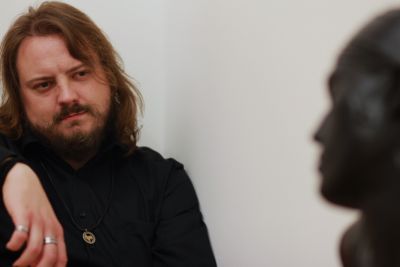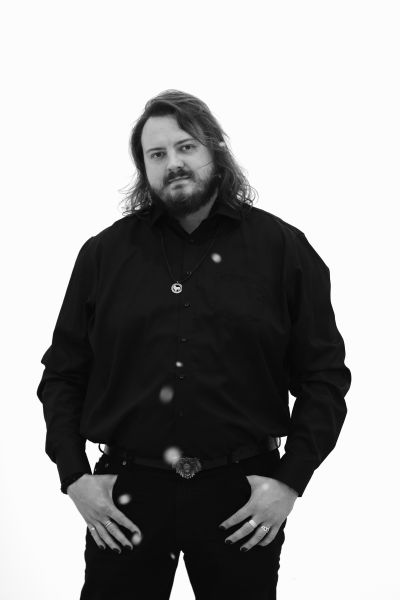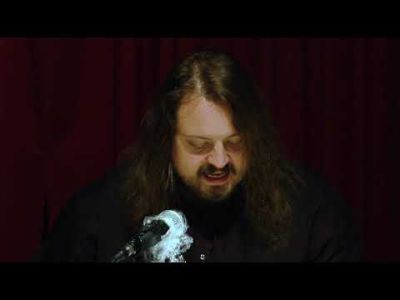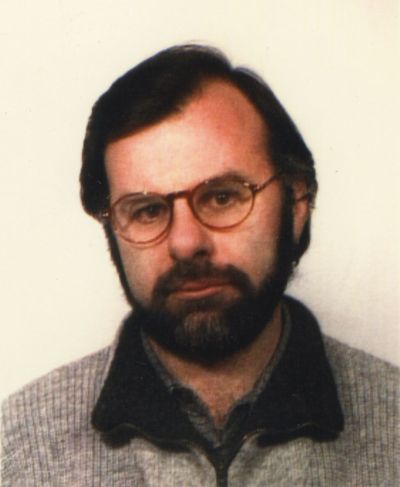The poet Martin Piekar – Connecting the inside to the outside
Martin Piekar was born in Germany in 1990 and grew up in Hesse. However, he has only held German citizenship since 2017. Until then he only had Polish citizenship, which he owes to his parents, who fled socialist Poland in the 1980s for political reasons. His father returned to his old homeland shortly after German reunification. Martin Piekar was still an infant at the time who could not yet know that he would later dedicate his life to poetry. He first lived with his mother in Bad Soden am Taunus, then in Frankfurt am Main. He would not come to Poland for a long time, as his mother was very resistant. Piekar calls it her private iron curtain. Piekar’s mother had experienced a lot of bad things in her old homeland: she was born in a gulag, then grew up in Białystok, became a teacher and finally decided to flee the detested political system. Her Polish teaching degree was not recognised in Germany, so she worked as a carer for the elderly – a typical problem for Polish immigrants.
Even as a child, Martin Piekar was a reflective, keen observer who got hung up on contradictions and injustices and daydreamed about other worlds. He began writing as a teenager to have an outlet, a “cleanser”, as he says. He began reading poetry. The young Piekar was particularly fond of the Romantics, and so his early attempts are characterised by fixed rhyme schemes and a yearning pathos. He loved the mysterious, dark side of Romanticism and found the right forms of expression for him in the Goth youth subculture. Soon he was dressing almost exclusively in black, dyeing his hair the same colour, listening to bands like “The Sisters of Mercy” or “Marilyn Manson” and giving his poems a gloomy touch. Looking back, he sees Romanticism as an escape movement. At first, he had more of a hunch than something he could clearly pinpoint: he would stagnate if he stuck to forms of expression that had been popular in the 19th century. And so he tried to explore contemporary poetry, even if he initially felt irritated by what at first glance appeared to be unwieldy forms of expression, and it took him some time to expand and change his aesthetic perception. He broke away from his Romantic role models and set out to be a contemporary poet. Piekar says of himself: “I wrote and wanted to write myself into the language and between people. I wanted to dedicate my language, my time, my thoughts to this: language, time, thinking – in the form of poetic texts.”
Those around him often found the resulting poems unwieldy, strange and sometimes unreadable. But Piekar resolutely continued along the path of the thinker and writer. He studied philosophy and history in Frankfurt and attended the “sexyunderground” meetings, which are still organised by the Literaturhaus Frankfurt to promote young literary talent. Above all, he continued to hone his style and also submitted some of his texts. Publications in the literary journals etcetera and Federwelt encouraged him to take part in competitions.
2012 would be a special year for Martin Piekar. If writing poetry were seen as a career path, one could speak of a breakthrough. Firstly, Piekar was chosen to take part in the Wolfenbüttel Literature Lab, where he could work on and discuss texts with other authors in a professional atmosphere. Better still: he was one of the finalists of the open mike literature competition, which is organised once a year by the Literaturwerkstatt Berlin. Being one of the 21 finalists means already having won over the jury with literary work from among hundreds of submissions, an achievement that ensures visibility in the literary world. The open mike attracts agents, publishers, literary critics and successful authors for whom the competition has served as a springboard in previous years. Martin Piekar read from his poetry cycles “Bastard” and “Bedürfnis nach dir und Kirschblüte” (“A need for you and cherry blossoms”). For example, lines like these:
Ich fühle mich so Bastard, wenn ich träume.
Nur Tunnelschachttage. Und nachts sind
meine Fantasien ans Hirninterieur genagelt.(“I feel so bastard when I dream.
Tunnel shaft days only. And at night
my fantasies are nailed to the inside of my brain.”)
Jury and audience were thrilled. Martin Piekar won the prize in the poetry category and was approached by publishers and agents immediately after his appearance. However, it would be another two years before his first volume of poetry entitled “Bastard Echo” was published by Verlagshaus Berlin. Piekar’s voice was heard. He won other awards such as the Irseer Pegasus and the Alfred Gruber Prize in Meran/Merano and published another volume of poetry in 2018: “AmokPerVers”. His material remains as diverse as it is personal. When asked about his topics, Piekar replies: “Everything that confuses me, fascinates me, leaves me doubtful: people. People and their perpetual struggle with their own emotions, feelings and reason.” In his eyes, feelings have long been an important political issue in our society and are worth exploring poetically. He says: “These politics of sensitivities can be worked out and scrutinised very well using language. So my material is the spoken word of people who express themselves, reveal themselves, enter into communication, try to be themselves.”
The significance of his Polish background for his writing became steadily clearer to Piekar over the years. “The Polish language had a huge impact on me”, he says today. “It’s like an elegantly meandering river. I see the German language as a solid paved path. When writing poetry, it’s important to master both paths, the laid-out path and the path of simply letting yourself drift.”
Piekar also sees the experience of being a white foreigner as an important part of his inspiration. He says that amongst his white friends, he was one of the few who knew what it was like to sweat in an immigration office. His family history with the traumas of war, imprisonment and flight has also left its mark on Piekar. He realises that freedom and democracy cannot be taken for granted, but have been hard-won, and in our day and age may have to be defended just as arduously.
For Piekar, the enduring tension between the individual and society is fascinating and deeply political. He is interested in how we negotiate our emotions internally and externally, and how we make political decisions on a daily basis, often in passing and without being fully aware of them. He sees poetry as a way of engaging with his own expression, which always comes from within and strives to reach the outside. For Piekar, language is thus both the way in and the way out. And a way to overcome the silence, the resignation. He says: “I feel that the greatest lack of understanding creates the greatest silence – people then stop talking to each other and only talk about each other.”
Piekar describes his style lyrically as:
Dunkel, dreckig, digital-affin.
Oral, offen, oczywisty.
Philosophisch, po prostu, Pathos.
Autentyczny, Ausbruch, ahnend.
Młody, merklich, mündlich.
Inny, Internet, introspektiv.
Nadziana, neugierig, nachfragend.(“Dark, dirty, digitally savvy.
Oral, open, oczywisty.
Philosophical, po prostu, pathos.
Autentyczny, awakening, anticipating.
Młody, marked, verbal.
Inny, internet, introspective.
Nadziana, nosy, questioning.”)
Asked about role models, he replies: “I want to be my own role model eventually.”
Martin Piekar now loves travelling to Poland. He has not made his mother’s fears his own: he loves the Polish language and poetry, Polish food and the ability of many people in Poland to be exuberant and open. In Germany, he sometimes misses this joyful, life-affirming atmosphere and also complains about the lack of Polish restaurants. At the same time, he enjoys living in Germany, loves the German language and poetry and appreciates the structures that he has known for so long. And, of course, his friends, his adopted home of Frankfurt am Main, his life as a poet and teacher are in Germany. He travels to Poland about twice a year. Once to visit relatives, and then again just for himself. “I know the country”, he says, “and yet I know so little of it”. For Polish-German relations, Piekar would like to see more interaction, more exchange and a recognition of similarities. He says: “We are neighbours and we will remain so.”
Last year, Martin Piekar became even better known in the literary world. With his text “Mit Wänden sprechen/Pole sind schwierige Volk” he won both the KELAG Prize and the Audience Award, which came with a scholarship in Klagenfurt, at the Festival of German-Language Literature (Bachmann Prize) in Klagenfurt. In the text, he pays tribute to his mother and her dramatic life story. Piekar has now published his third volume of poetry under the title “livestream & leichen” (“livestream and corpses”). In it, he combines Polish and German, gives both backgrounds and languages space and, in combination with Nina Kaun’s illustrations, creates a completely unique atmosphere. As the title of the anthology of poems suggests, Piekar combines current themes and today’s use of language with his black Romantic vein, thereby breaking both in favour of a more complex view of the inside of an ego that continually seeks to connect with and protect itself from the outside.
Martin Piekar is currently working on his first novel, the content of which he does not yet want to reveal. With regard to poems, he says: “I will be working on them my whole life.”
Anselm Neft, March 2024
The artist online: https://martin-piekar.net/





